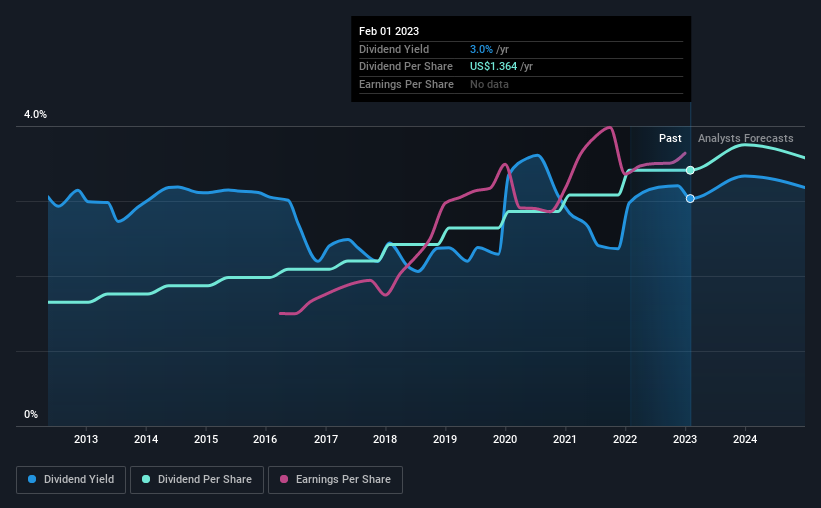Republic Bancorp (NASDAQ:RBCA.A) Has Announced That It Will Be Increasing Its Dividend To $0.374
Republic Bancorp, Inc. (NASDAQ:RBCA.A) will increase its dividend on the 21st of April to $0.374, which is 9.7% higher than last year's payment from the same period of $0.341. This takes the annual payment to 3.0% of the current stock price, which is about average for the industry.
Check out our latest analysis for Republic Bancorp
Republic Bancorp's Payment Expected To Have Solid Earnings Coverage
We like to see a healthy dividend yield, but that is only helpful to us if the payment can continue.
Republic Bancorp has established itself as a dividend paying company with over 10 years history of distributing earnings to shareholders. Based on Republic Bancorp's last earnings report, the payout ratio is at a decent 30%, meaning that the company is able to pay out its dividend with a bit of room to spare.
Looking forward, earnings per share is forecast to fall by 0.6% over the next 3 years. Fortunately, analysts forecast the future payout ratio to be 32% over the same time horizon, which is in the range that makes us comfortable with the sustainability of the dividend.
Republic Bancorp Has A Solid Track Record
Even over a long history of paying dividends, the company's distributions have been remarkably stable. Since 2013, the dividend has gone from $0.66 total annually to $1.36. This means that it has been growing its distributions at 7.5% per annum over that time. The growth of the dividend has been pretty reliable, so we think this can offer investors some nice additional income in their portfolio.
The Dividend Looks Likely To Grow
Some investors will be chomping at the bit to buy some of the company's stock based on its dividend history. It's encouraging to see that Republic Bancorp has been growing its earnings per share at 16% a year over the past five years. A low payout ratio and decent growth suggests that the company is reinvesting well, and it also has plenty of room to increase the dividend over time.
We Really Like Republic Bancorp's Dividend
In summary, it is always positive to see the dividend being increased, and we are particularly pleased with its overall sustainability. The company is generating plenty of cash, and the earnings also quite easily cover the distributions. We should point out that the earnings are expected to fall over the next 12 months, which won't be a problem if this doesn't become a trend, but could cause some turbulence in the next year. All in all, this checks a lot of the boxes we look for when choosing an income stock.
Market movements attest to how highly valued a consistent dividend policy is compared to one which is more unpredictable. Meanwhile, despite the importance of dividend payments, they are not the only factors our readers should know when assessing a company. For example, we've picked out 1 warning sign for Republic Bancorp that investors should know about before committing capital to this stock. If you are a dividend investor, you might also want to look at our curated list of high yield dividend stocks.
Have feedback on this article? Concerned about the content? Get in touch with us directly. Alternatively, email editorial-team (at) simplywallst.com.
This article by Simply Wall St is general in nature. We provide commentary based on historical data and analyst forecasts only using an unbiased methodology and our articles are not intended to be financial advice. It does not constitute a recommendation to buy or sell any stock, and does not take account of your objectives, or your financial situation. We aim to bring you long-term focused analysis driven by fundamental data. Note that our analysis may not factor in the latest price-sensitive company announcements or qualitative material. Simply Wall St has no position in any stocks mentioned.
Join A Paid User Research Session
You’ll receive a US$30 Amazon Gift card for 1 hour of your time while helping us build better investing tools for the individual investors like yourself. Sign up here

 Yahoo Finance
Yahoo Finance 
